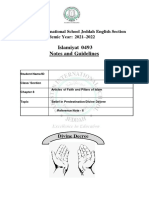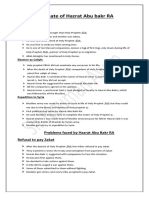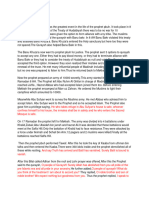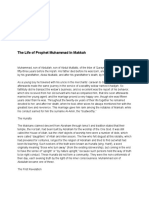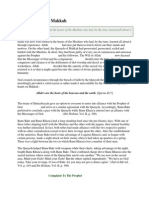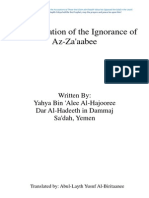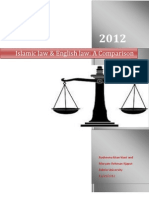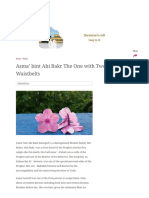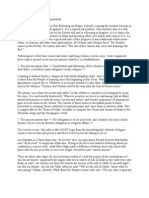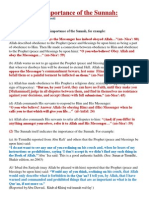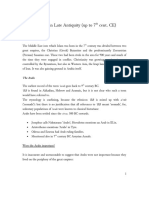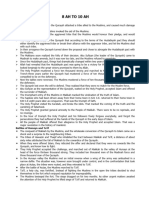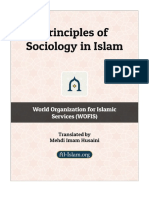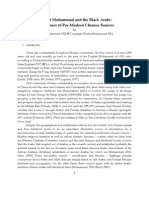Treaty of Hudaibiyyah
Treaty of Hudaibiyyah
Uploaded by
shuaibyousafCopyright:
Available Formats
Treaty of Hudaibiyyah
Treaty of Hudaibiyyah
Uploaded by
shuaibyousafCopyright
Available Formats
Share this document
Did you find this document useful?
Is this content inappropriate?
Copyright:
Available Formats
Treaty of Hudaibiyyah
Treaty of Hudaibiyyah
Uploaded by
shuaibyousafCopyright:
Available Formats
Treaty Of Hudaibiyyah
Early in A.D. 628 the Holy Prophet (Sallallahu 'Alayhi Wasallam) decided to proceed to Mecca to perform the pilgrimage. He was accompanied by companions about fourteen hundred in number. Hadhrat Umar (Radhi Allahu 'Anh) also accompanied the Holy... Early in A.D. 628 the Holy Prophet decided to proceed to Mecca to perform the pilgrimage. He was accompanied by companions about fourteen hundred in number. Hadhrat Umar also accompanied the Holy Prophet . In order to convince the Quraish that the Muslims had no war-like intentions against them, the Holy Prophet decided that they would carry no arms. When the Muslims halted at Zul Hulaifah six miles from Madina, Hadhrat Umar waited on the Holy Prophet and submitted that no reliance could be placed on the Quraish and accordingly it was unsafe to proceed to Mecca without arms. Hadhrat Umar urged that for self-defense the Muslims should be armed. The Holy Prophet accepted the advice of Hadhrat Umar , and some persons were sent to Madina to bring in arms. When the Quraish of Mecca came to know that the Muslims were coming to Mecca they sent Khalid bin Walid and Ikramah bin Abu Jahl with two hundred horsemen to intercept the Muslims, and prevent their advance to Mecca. Finding the way to Mecca barred the Holy Prophet consulted his companions as to what course of action they should adopt. The consensus of opinion was that they should go ahead. If they were stopped they would fight; otherwise not. The Holy Prophet enquired of his companions whether any one out of them could lead the Muslims to Mecca by a path other than the main route barred by the enemy. One of the companions volunteered to show an alternative way. He led the Muslims on a way full of rough rocks through the ravines of Mudniya. After a weary march the Muslims reached Hudaibiya on the lower side of Mecca and within the sacred territory. The Muslims encamped at Hudaibiya, and here Urwa bin Masud came to see the Holy Prophet on behalf of the Quraish. He talked in diplomatic language, and tried to impress that the Quraish were strong and would not allow the Muslims to visit Mecca. He also insinuated that at the time of crisis the followers of the Holy Prophet were likely to leave him. Thereupon the companions of the Holy Prophet said, "May God curse you; how dare you think that we will abandon the Holy Prophet . Rest assured we will fight to the last for him". When Urwa returned to the Quraish, he gave his impressions about the Holy Prophet and the Muslims in the following terms: "O people of the Quraish! I have seen kings but by God I have never seen a king as I have seen Muhammad amongst his companions. If he makes his ablutions they would not let the water fall on the ground; if a hair of his body falls they pick it up. They will not surrender him for anything in any case, do what you may."
As among the Quraish, the Adis specialized in diplomatic skill the Holy Prophet wanted Hadhrat Umar to go to the Quraish to negotiate. Hadhrat Umar submitted that he was a person non grata with the Quraish, and his mission was not likely to be successful. He advised that Hadhrat Usman who was soft spoken and was popular with the Quraish should be sent on the mission. The advice was accepted and Usman was accordingly sent to the Quraish to negotiate regarding the Muslim's entry into Mecca and performing the pilgrimage. When three days passed away, and Hadhrat Usman did not return from Mecca a rumour got afloat that he had been killed by the Quraish. Hadhrat Umar donned his arms and accoutrements and waited on the Holy Prophet . He submitted that if the Quraish had killed Hadhrat Usman , the Muslims should fight the Meccans to the bitter end. The Holy Prophet asked all his Companions about 1,400 in number to assemble and take a vow binding themselves to Jihad against the infidels. The Holy Prophet sat under a tree, and all the Companions took the oath turn by turn. God approved of this measure, and the following verse was revealed to the Holy Prophet : "Verily Allah was pleased with the faithful that they swore allegiance to thee under the tree."
In view of the pleasure of God, this oath later came to be called 'the Bait-ul-Rizwan'- the oath that pleased God. A little later Hadhrat Usman returned from Mecca along with some emissaries from the Quraish. After some further negotiations the terms of a pact between the Muslims and the Quraish were hammered out. These terms were: There was to be a truce between the Muslims and the Quraish for a period of ten years. 1. If any tribe wanted to enter into treaty with the Muslims it could do so, and whoever wished to enter a covenant with the Quraish was likewise free to do so.
2. If any one from the Quraish came to the Muslims without the permission of his guardian, he was to be returned to the Quraish. On the other hand if a Muslim sought refuge with the Quraish, he was not to be delivered to the Muslims.
3. The Muslims were to withdraw that year without performing the pilgrimage. They were free to perform the Hajj the following year when they could stay in Mecca for three days.
Prima facie these terms favoured the Quraish and Hadhrat Umar them. He waited on the Holy Prophet and submitted:
felt very bitter about
"O Prophet of God! Are you not the Messenger of God?" "Certainly I am", said the Holy Prophet . . . .
"Are not our enemies idolatrous polytheists?" asked Umar "Undoubtedly they are", rejoined the Holy Prophet "Why should then we disgrace our religion?" added Umar
The Holy Prophet said, "I am the Messenger of God, and I do not act in contravention of His commandments." This silenced Hadhrat Umar , but he felt these terms to be humiliating to the Muslims. He saw Hadhrat Abu Bakr , and wanted him to persuade the Holy Prophet to revise the terms. Hadhrat Abu Bakr said: "The Holy Prophet knows things better than we do. What the Holy Prophet has done is in the interests of the Muslims. Have faith in God. Do not be critical and hold fast to the stirrup of the Holy Prophet ." Thereafter the pact which came to be known as the Hudaibiya pact was duly signed between the Muslims and the Meccans. On behalf of the Muslims, the pact was among others signed by Hadhrat Umar . After the pact had been signed Suhail's son Abu Jandal who had accepted Islam and was a captive with the Meccans escaped from the captivity and came to seek refuge in the Muslim camp. Suhail followed his son and demanded that in accordance with the Hudaibiya pact his son should be returned to him. Umar advocated that as Abu Jandal did not want to return, it was unfair to force him to return. The Holy Prophet said that they had entered into a pact with the Meccans and as Muslims they could not go back upon their word. He allowed Suhail to take away his son. Turning to Abu Jandal the Holy Prophet said, "Abu Jandal be patient. God in His bounty will Himself devise some way to facilitate your return to the Muslims". Hadhrat Umar went some distance with Abu Jandal and Suhail. He kept goading Abu Jandal with his sword, and the idea was that he should take the sword and kill his father. Abu Jandal was too depressed and confused to follow the clue. When Suhail and his son rode off to Mecca, Hadhrat Umar returned to the Muslim camp crest fallen. The Muslims struck camp, and started on the return journey to Madina. Hadhrat Umar felt unhappy. He was bitter that in this deal the Quraish had had the upper hand. In the way, Surah Al-Fath was revealed to the Holy Prophet . "Verily, We have opened wide for thee the gates of victory." The Holy Prophet called for Hadhrat Umar and told him that God had that day revealed to him that the Hudaibiya pact would lead to the victory of the Muslims. That made Hadhrat Umar rejoice. Hadhrat Abu Bakr assessed the treaty of Hudaibiya in the following terms: No victory of Islam has more importance than the treaty of Hudaibiya. Men are always for hurrying things on,
but God lets them ripen. Previously there had subsisted a wall of partition between the Muslims and the rest of the men; they never spoke to each other, and wherever they met they began to fight. Subsequently hostility died down, and security and mutual confidence took its place. Every man of even moderate intelligence who heard of Islam joined it, and the twenty-two months in which the truce subsisted the number of conversions was greater than throughout the whole of the previous period, and the faith of Islam diffused itself in all directions among the people. Hudaibiya Pact Developments In the wake of the Hudaibiya pact there took place developments which affected Umar personally. At the time of Hudaibiya pact it was undertaken that if any person from the Quraish accepted Islam such a person was to be returned to the Quraish. Some men from among the Quraish accepted Islam and sought shelter with the Muslims. In accordance with the terms of the pact these persons were returned to the Quraish. Later a crisis developed when some Quraish women accepted Islam against the wishes of their parents and husbands and sought refuge with the Muslims. The Quraish wanted such women to be returned to them. The [saw[Holy Prophet refused to return such women to the Quraish as in the meantime God had revealed: "Believers, when believing women came to you as refugees, examine them. Allah knows the state of their faith. If you find them to be true believers do not return them to the unbelievers. They are not lawful to the unbelievers, nor are the unbelievers lawful to them. You shall, however, give to their former husbands what they have spent on them. And you will be doing nothing unlawful after you have given them dowries." [60: 10]
Another verse on the same subject provided: "Do not marry idolatresses until they embrace the faith. And do not marry your women to idolaters."
Hadrat Umar
had three wives, namely: ;
1. Zainab bint Mazaun Jamiah
2. Malaika bint Jarul Khuzai; and
3. Qariba bint Abi Umayya Makhzumi.
Out of these three, only Zainab bint Mazaun had accepted Islam and migrated to Madina. The other two ladies did not accept Islam and did not choose to migrate. After the Hudaibiya pact, Hadhrat Umar divorced Malaika as well as Qariba. After being divorced by Hadhrat Umar , Malaika married Abu Jahm bin Hazifa while Qariba married Abdur Rahman son of Abu Bakr who was still an infidel. After the Hudaibiya pact the first Muslim woman who fled from the Quraish and sought refuge with the Muslims was Sabiha bint al-Haris . Her husband did not accept Islam. When the Quraish came to demand the restoration of Sabiha , the Holy Prophet refused to return her to the Quraish saying that the condition in the pact applied to men only and not to women. The Holy Prophet had Sabiha married to Umar . In Madina, Hadhrat Umar married an Ansar lady Asiah bint Sabat Ansari . On marriage Hadhrat Umar changed her name to Jamila. Hadhrat Umar resided with her at Quba. It is reported that for some years she was Hadhrat Umar's favorite wife. A few years later, Hadhrat Umar divorced her and shifted to Madina. The reason why Hadhrat Umar divorced her is not known.
You might also like
- The Battle of MutahDocument4 pagesThe Battle of MutahshuaibyousafNo ratings yet
- Umar RA Notes UPDATEDDocument24 pagesUmar RA Notes UPDATEDmtayyab zahidNo ratings yet
- Problems Faced by Abu Bakr Within ArabiaDocument7 pagesProblems Faced by Abu Bakr Within Arabiasyed babar khan babar khan100% (2)
- Madni Life of Prophet Muhammad PBUH: 2 HijrihDocument14 pagesMadni Life of Prophet Muhammad PBUH: 2 HijrihFarhan Khan100% (3)
- Caliphate of Hazrat Abu Bakr (Extensive) PDFDocument10 pagesCaliphate of Hazrat Abu Bakr (Extensive) PDFMadifa Queen100% (1)
- 3.4 HAZRAT ALI Radi Allahu Anhu: FOURTH CALIPH (656-661 AD)Document10 pages3.4 HAZRAT ALI Radi Allahu Anhu: FOURTH CALIPH (656-661 AD)Anas AdilNo ratings yet
- CIE Islamiat Jihad P2Document3 pagesCIE Islamiat Jihad P2XPhysixZ100% (1)
- Detailed Discussion About Witr According To The Hanafi Fiqh by MUFTI IBRAHIM DESAIDocument7 pagesDetailed Discussion About Witr According To The Hanafi Fiqh by MUFTI IBRAHIM DESAIMUSALMAN BHAINo ratings yet
- (Assignment) The Life of Holy Prophet at MadinaDocument5 pages(Assignment) The Life of Holy Prophet at MadinaMUHAMMAD SHAHEER ALI QUADRI100% (4)
- Hazrat Abu Bakr (632 - 634 A.D) : Professor TajuddinDocument37 pagesHazrat Abu Bakr (632 - 634 A.D) : Professor TajuddinCh saab14100% (1)
- 7) Life in MadinaDocument22 pages7) Life in MadinaHasanShaikhNo ratings yet
- Ansar and MuhajireenDocument1 pageAnsar and MuhajireenWaleed Rashid100% (2)
- Life and Achievements of Hazrat Uthman UsmanDocument1 pageLife and Achievements of Hazrat Uthman UsmanLovely Khan100% (4)
- 5) Life in MakkahDocument13 pages5) Life in MakkahHasanShaikh100% (3)
- Caliphate of Hazrat Umar Farooq RADocument15 pagesCaliphate of Hazrat Umar Farooq RAsyed babar khan babar khanNo ratings yet
- Battle of Khaybar (Gazwah Khaibar)Document11 pagesBattle of Khaybar (Gazwah Khaibar)Waleed Khan100% (1)
- Hazrat UmarDocument15 pagesHazrat UmarMS.MOIN100% (1)
- Caliphate of Hazrat UsmanDocument4 pagesCaliphate of Hazrat UsmanAmna AbidNo ratings yet
- Hazrat Umar As The Second CaliphDocument13 pagesHazrat Umar As The Second CaliphMS.MOINNo ratings yet
- Persecution On ProphetDocument1 pagePersecution On ProphetTaha YousafNo ratings yet
- Caliphate of Hazrat UsmanDocument6 pagesCaliphate of Hazrat UsmanMadifa QueenNo ratings yet
- Letter To EmperorsDocument3 pagesLetter To EmperorsFIRE WOLF0% (1)
- Mairaj - The AscentDocument2 pagesMairaj - The Ascentzermina khanNo ratings yet
- Types & Levels of PreachingDocument4 pagesTypes & Levels of PreachingUmmama Bhutta50% (2)
- Caliphate of Hazrat AliDocument7 pagesCaliphate of Hazrat AliMadifa Queen100% (1)
- Life in Makkah - 570-610AD - Birth To ProphethoodDocument7 pagesLife in Makkah - 570-610AD - Birth To ProphethoodMadifa Queen100% (1)
- Hazrat UthmanDocument4 pagesHazrat UthmanSyed Bilal HyderNo ratings yet
- Classification of HadithDocument4 pagesClassification of Hadithdifferent person0% (1)
- Islamiyat - Life of Prophet Booklet Life in MakkahDocument54 pagesIslamiyat - Life of Prophet Booklet Life in MakkahMuhammad TalhaNo ratings yet
- Expansion of Muslim Empire During The Caliphate of Abu BakrDocument1 pageExpansion of Muslim Empire During The Caliphate of Abu BakrdisyNo ratings yet
- Public Administration Assignment #1Document11 pagesPublic Administration Assignment #1Hamza Usman100% (1)
- First Islamic CommunityDocument69 pagesFirst Islamic CommunityMS.MOIN100% (2)
- Week 06 Day 02 P1 2022 - Muzammil O Level IslamiyatDocument6 pagesWeek 06 Day 02 P1 2022 - Muzammil O Level IslamiyatOmer Ali MalikNo ratings yet
- Updated CH 2 Ijma, Qiyas, Four SourcesDocument27 pagesUpdated CH 2 Ijma, Qiyas, Four SourcesTeck TieNo ratings yet
- Administeration of Hazrat Umar Radi-Allahu-AnhuDocument8 pagesAdministeration of Hazrat Umar Radi-Allahu-AnhuRizwanaNo ratings yet
- Past Paper Questions of All Caliphs 2. The Specialty of The Rightly Guided Caliphs (Combined Question About The Caliphs)Document10 pagesPast Paper Questions of All Caliphs 2. The Specialty of The Rightly Guided Caliphs (Combined Question About The Caliphs)TahaNo ratings yet
- 6 - Belief Predestination Divine DecreeDocument6 pages6 - Belief Predestination Divine DecreeTeck TieNo ratings yet
- Life in Madinah Notes PDF Muhammad MedinaDocument1 pageLife in Madinah Notes PDF Muhammad MedinaHaniya AmanullahNo ratings yet
- Umer (RA) During The Life of Prophet (SAW)Document7 pagesUmer (RA) During The Life of Prophet (SAW)ayirahNo ratings yet
- Administration of Hazrat Usman RADocument8 pagesAdministration of Hazrat Usman RAKami Chemist0% (1)
- Arrival of The BritishDocument9 pagesArrival of The BritishMuhammad Asad AliNo ratings yet
- Khyber ExpeditionDocument1 pageKhyber ExpeditionMuhammad Talha Subhani100% (1)
- Persecutions and Difficulties in Makkah Prophet: (P.B.U.H)Document10 pagesPersecutions and Difficulties in Makkah Prophet: (P.B.U.H)Ibrahim SheikhNo ratings yet
- Articles of FaithDocument18 pagesArticles of FaithKiren Lakhani67% (3)
- Cie Islamiat P2 Rightly Guided CaliphsDocument29 pagesCie Islamiat P2 Rightly Guided CaliphsXPhysixZ100% (2)
- Life in Madinah Umar KhanDocument20 pagesLife in Madinah Umar KhanTayyab KhanNo ratings yet
- Caliphate of Hazrat UsmanDocument19 pagesCaliphate of Hazrat UsmanMS.MOIN100% (1)
- Caliphate of Hazrat Abu Bakr RADocument3 pagesCaliphate of Hazrat Abu Bakr RAMeesam JafriNo ratings yet
- Past Paper QuestionsDocument10 pagesPast Paper QuestionsrayyanwassanNo ratings yet
- Notes First Islamic CommunityDocument12 pagesNotes First Islamic CommunitySaad KhanNo ratings yet
- The Battle of BadrDocument8 pagesThe Battle of BadrZeeshan Ul Haq100% (1)
- Conquest of MakkahDocument2 pagesConquest of MakkahAbdulRahman AamirNo ratings yet
- Abu Bakr (RA) As First Caliph - Administration-Dealing With False ProphetsDocument5 pagesAbu Bakr (RA) As First Caliph - Administration-Dealing With False ProphetsTEHNYET ARAIN100% (1)
- The Hadith of Prophet (P.B.U.H) - O Level Islamiat NotesDocument9 pagesThe Hadith of Prophet (P.B.U.H) - O Level Islamiat NotesIftikhar AhmedNo ratings yet
- Makki and Madni LifeDocument14 pagesMakki and Madni Lifehabib wattoo100% (1)
- The City School: Class: 10 N Subject: Islamiyat 2058 DATE: 13/04/2020Document22 pagesThe City School: Class: 10 N Subject: Islamiyat 2058 DATE: 13/04/2020Taha YousafNo ratings yet
- 1AH - Main Events & BrotherhoodDocument10 pages1AH - Main Events & BrotherhoodValerie0% (1)
- Khulafa-e-Rashideen - The Rightly Guided SuccessorsDocument7 pagesKhulafa-e-Rashideen - The Rightly Guided SuccessorsMehr AymenNo ratings yet
- The Battle of TaifDocument6 pagesThe Battle of TaifshuaibyousafNo ratings yet
- Islamiat Chapter 1 Fundamental BeliefsDocument39 pagesIslamiat Chapter 1 Fundamental BeliefsAbdul Azeem KhosoNo ratings yet
- Week 03 Day 03 P1 October 2020Document3 pagesWeek 03 Day 03 P1 October 2020Riemn FarhanNo ratings yet
- 6th Year of Hijra BY FahadDocument2 pages6th Year of Hijra BY FahadFahad SheikhNo ratings yet
- Al Sharh Ul Sameri Vol 1 PDFDocument493 pagesAl Sharh Ul Sameri Vol 1 PDFshuaibyousafNo ratings yet
- Hizb e Azam Abridged by Shaykh Sufi Iqbal Madni PDFDocument91 pagesHizb e Azam Abridged by Shaykh Sufi Iqbal Madni PDFshuaibyousafNo ratings yet
- The Conquest of MakkahDocument14 pagesThe Conquest of MakkahshuaibyousafNo ratings yet
- The Battle of UhudDocument12 pagesThe Battle of UhudshuaibyousafNo ratings yet
- The Battle of The TrenchDocument9 pagesThe Battle of The TrenchshuaibyousafNo ratings yet
- The Battle of TaifDocument6 pagesThe Battle of TaifshuaibyousafNo ratings yet
- The Battle of KhayberDocument8 pagesThe Battle of KhaybershuaibyousafNo ratings yet
- The Battle of HunaynDocument5 pagesThe Battle of HunaynshuaibyousafNo ratings yet
- Abdullah From MallorcaDocument8 pagesAbdullah From Mallorcaياسر داؤودNo ratings yet
- PART 5 Refutation Upon Az-Za'AabeeDocument15 pagesPART 5 Refutation Upon Az-Za'AabeeFahd Al-Trishoor'eeNo ratings yet
- Islamic Law & English Law: A Comparison: Rosheena Khan Kiani and Maryam Rehman Rjaput Bahria University 12/21/2012Document26 pagesIslamic Law & English Law: A Comparison: Rosheena Khan Kiani and Maryam Rehman Rjaput Bahria University 12/21/2012maryam_mishal1No ratings yet
- Asma' Bint Abi Bakr The One With Two Waistbelts - IslamOnlineDocument3 pagesAsma' Bint Abi Bakr The One With Two Waistbelts - IslamOnlineAmissie DalabaniNo ratings yet
- Equality: (1) IntroductionDocument5 pagesEquality: (1) IntroductionHamza BilalNo ratings yet
- Friday Bulletin 721Document8 pagesFriday Bulletin 721Jamia Nairobi100% (1)
- Who Is Alahazrat (English)Document85 pagesWho Is Alahazrat (English)Dar Haqq (Ahl'al-Sunnah Wa'l-Jama'ah)No ratings yet
- 70 Facts About sahabaDocument4 pages70 Facts About sahabaGc Abdul RehmanNo ratings yet
- The Art of Clear ThinkingDocument98 pagesThe Art of Clear ThinkinghmsNo ratings yet
- (SALAFIMEDIA) - What Is Known in Islam by Necessity - Abu Bilal HalabiDocument541 pages(SALAFIMEDIA) - What Is Known in Islam by Necessity - Abu Bilal Halabimarmar92100% (1)
- Islamic Names - ArabicDocument109 pagesIslamic Names - ArabicAbdul Aleem100% (2)
- Fitna of La MadhhabiyyaDocument6 pagesFitna of La MadhhabiyyaMujahid Asaadullah AbdullahNo ratings yet
- Proof of The Importance of The SunnahDocument4 pagesProof of The Importance of The SunnahIbn SadiqNo ratings yet
- Talaq Al Tafwid - Muhammad MunirDocument33 pagesTalaq Al Tafwid - Muhammad MunirSami UddinNo ratings yet
- Lecture Notes On Pre Islamic ArabsDocument8 pagesLecture Notes On Pre Islamic ArabsKhadijah ShuaibuNo ratings yet
- GRD 7 History Notes T 1 2018 ApprovedDocument20 pagesGRD 7 History Notes T 1 2018 ApprovedpeterNo ratings yet
- Early Marriage in History and Islam Part 2Document17 pagesEarly Marriage in History and Islam Part 2Arshad Farooqui100% (5)
- Tadhkirah Ibn MulaqqinDocument22 pagesTadhkirah Ibn MulaqqinMNooriNo ratings yet
- Model Stories PartDocument9 pagesModel Stories Partapi-3705043No ratings yet
- TraditionDocument10 pagesTraditionLevi AckermanNo ratings yet
- 8 Ah To 11ahDocument4 pages8 Ah To 11ahXEONNo ratings yet
- Golden Stories of Sayyida Khadijah (R.A)Document93 pagesGolden Stories of Sayyida Khadijah (R.A)The Choice100% (1)
- Expectations of The Muslim Woman - Ali ShariatiDocument14 pagesExpectations of The Muslim Woman - Ali ShariatiBMT-link100% (2)
- Lecture 03Document5 pagesLecture 03Ňěwťóň ŠháhNo ratings yet
- Aslam FileDocument20 pagesAslam Fileaslammakandar123No ratings yet
- Principles of Sociology in IslamDocument15 pagesPrinciples of Sociology in IslamBilal AhmadNo ratings yet
- Quran and Environment-PowerPointDocument59 pagesQuran and Environment-PowerPointsefik60100% (1)
- Muhammad Kudhori - Perlunya Memahami Hadis Secara Tekstual Dan Kontekstual 2017 1Document28 pagesMuhammad Kudhori - Perlunya Memahami Hadis Secara Tekstual Dan Kontekstual 2017 1Mochamad FaqihNo ratings yet
- Muhammad Black Arabs China.170121911Document15 pagesMuhammad Black Arabs China.170121911Derrick TaylorNo ratings yet




































